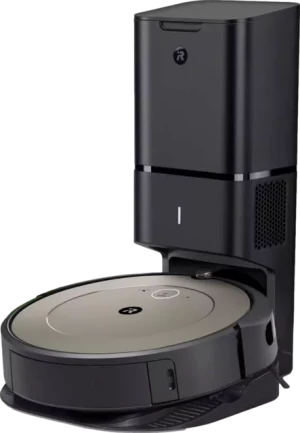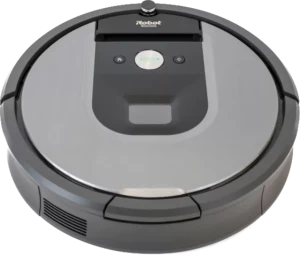iRobot 960 Roomba cleans all floor types, this feature is essential, since different rooms within a home may have various types of flooring i.e. carpets. If a robot vacuum is stated as being able to clean all floor types, this means that the robot vacuum is designed and equipped to effectively clean a wide range of flooring materials without much significant issues.
iRobot 960 Roomba has an obstacle sensor, this serves the purpose of detecting and identifying objects in the robot's route, this allwos it to navigate around them thus avoiding collisions. The iRobot 960 Roomba has 3 cleaning modes, the cleaning modes offered by robot vacuum cleaners can vary depending on the design of the robot vacuum. The iRobot 960 Roomba has a period of 1 year, warranty periods for robot vacuums typically range from 1 - 2 years, however some higher-end models may give longer warranty periods.
Roomba i1 Plus, at 1 year
has the same warranty period as that of iRobot 960 Roomba. When considering a robot vacuum cleaner, it's essential to read and understand the warranty terms and conditions, as well as any limitations or exclusions that may apply. iRobot 960 Roomba's dustbin capacity is at 0.6L, dustbin capacity indicates how much dust, dirt, and pet hair the vacuum can hold before it can be emptied.
Roomba i1 Plus, at 0.4L
carries less dirt than the iRobot 960 Roomba by only 0.2L
The dustbin capacity can vary widely among different robot vacuum models, and the capcity you choose should be based on your cleaning needs and the size of the area you want to clean. iRobot 960 Roomba has twin side brushes, twin side brushes can be useful for certain cleaning tasks, as they help the robot vacuum sweep dirt and debris from corners and along edges. Many robot vacuum cleaners are equipped with sensors and indicators to notify users when the dirt collection container is full and needs to be emptied.
iRobot 960 Roomba supports this feature, which prevents the robot vacuum from getting clogged thus performance will be maintained as soon as the bin is emptied. Roomba i1 Plus also can indicate when its dustbin is full, for a robot vacuum to indicate that it's full can improve the convenience of owning one since it reduces the need for constant monitoring. iRobot 960 Roomba weighs 4kg, robot vacuums are commonly designed to be lightweight and compact to easily get around and portability.
The Roomba i1 Plus, at 4.7kg
weighs more than the iRobot 960 Roomba with a difference of 0.7kg. It's advisable to consider the weight of the vacuum when selecting a model, and that's if you plan to carry it up and down stairs
iRobot 960 Roomba has a width of 350mm, often referred to as its cleaning path width, refers to the width of the area that the robot vacuum can properly clean in a single pass. The width of a robot vacuum is key as it can affect its efficiency and the time it takes to clean a room
Roomba i1 Plus, at 338mm
measures less in width than the iRobot 960 Roomba with a difference of 12mm.
A wider cleaning path can cover more ground in a single pass, reducing the time it takes to clean a room. iRobot 960 Roomba's height measures 91mm, here you are considering the measure from the bottom of the robot vacuum to its highest point. Height is an important consideration, especially if you have furniture with low clearance in your home.
The Roomba i1 Plus, at 92mm
measures more in height than the iRobot 960 Roomba with a difference of 1mm. When choosing a robot vacuum, make sure that the robot vacuum can go under the furniture and navigate effectively in your living space without getting stuck or causing damage. The battery power of a robot vacuum cleaner is important as it determines how long the vacuum can run on a single charge.
Battery capacity is typically measured in milliampere-hours (mAh), iRobot 960 Roomba's battery power is 2,600mAh
The Roomba i1 Plus, at mAh1,800
has less battery power than the iRobot 960 Roomba by only
A bigger capacity usually means longer battery life which can be beneficial if you have a large room or if you would like the robot vacuum to complete operations with fewer interruptions to recharge. The operating time of a robot vacuum cleaner refers to the time the vacuum can clean continuously on a single battery charge before it needs to be recharged. iRobot 960 Roomba's operating time is 1.25h
The Roomba i1 Plus, at 1.25h
has the same operating time as the iRobot 960 Roomba
Always plan cleaning cycles around the vacuum's operating time to maximize efficiency and prevent "incomplete work" between charge intervals.
iRobot 960 Roomba has a charge time of 2h, the charge time of a robot vacuum cleaner refers to the amount of time it takes for the vacuum's battery to recharge fully after it has been depleted during a cleaning cycle. Roomba i1 Plus, at 2.5h
charges for longer than the iRobot 960 Roomba with a difference of 0.5h. Charge time is an important factor to consider when choosing a robot vacuum, as it determines how long you'll need to wait before the vacuum begins its next cleaning cycle.
The operating power consumption of a robot vacuum cleaner refers to the amount of electrical power the vacuum uses while it's actively cleaning your home. iRobot 960 Roomba has a power consumption of 30W, power is often measured in watts (W) and can vary among different robot vacuum models based on several consuption factors. The Roomba i1 Plus, at 28W
consumes less power than the iRobot 960 Roomba with a difference of 2W.
Lower power consumption can be more energy-efficient and cost-effective over time, but it may also affect cleaning performance, especially on carpets. Auto-off is a feature designed to automatically turn off the vacuum after it has completed a cleaning cycle or when specific conditions occur. iRobot 960 Roomba has an auto-off feature, which is useful for energy efficiency and battery preservation.
That's right, many modern robot vacuum cleaners can mop floors in addition to vacuuming. Such robot vacuums are often referred to as robot vacuum and mop models and iRobot 960 Roomba is one of those robot vacuums
iRobot 960 Roomba has a dirt sensor, these are designed to detect the concentration of dirt, dust, or debris in the space being cleaned and can be used to adjust the vacuum's cleaning behavior during cleaning cycle. You may want to consider buying either the Roomba i1 Plus or iRobot 960 Roomba If you value the ability to automatically adjust the cleaning modes of the robot vacuum based on the level of dirt and debris in your home.
iRobot 960 Roomba supports a smartphone app, through which you can control and monitor the vacuum remotely through your smartphone or tablet. Both the Roomba i1 Plus and iRobot 960 Roomba have mobile application support, mobile apps enhance the user experience by providing convenience, and ease update of features and functionalities. This feature in robot vacuum cleaners is intended to eliminate the chance of the robot vacuum becoming stuck during cleaning.
Robot vacuums such as the iRobot 960 Roomba are equipped with various sensors and technologies to navigate around obstacles and avoid getting trapped, however the effectiveness of this feature can vary among different models. Both the Roomba i1 Plus and iRobot 960 Roomba have the "anti-stuck" feature, however clearing clutter, ensuring proper cable management, and creating clear paths for the vacuums can help further reduce the chances of getting stuck during cleaning. These virtual barriers are set up and managed via the robot vacuum's mobile app, similar to no-go zones, these barriers are designed to help you control and restrict where the robot vacuum can and cannot go during cleaning.
Both iRobot 960 Roomba and Roomba i1 Plus support virtual barriers, the ability to set virtual barriers is mostly useful for spaces with areas where the robot vacuum may encounter obstacles. iRobot 960 Roomba has a route mapping feature which enables it to generate a map of your home and plan efficient cleaning routes. This mapping capability enhances the vacuum's ability to work effectively and systematically.
Route mapping is an important feature as it makes it possible for robot vacuums such as the Roomba i1 Plus to adapt to the layout of your space to work more efficiently and reduce the chance of missing certain spots. Voice prompts refer to audible messages that the vacuum emits to provide you alerts on the different states of the vacuum. iRobot 960 Roomba has this feature
The Roomba i1 Plus also supports voice prompts, this feature is useful for you who like audible notifications or users who have visual impairments.
Auto-docking is a feature in robot vacuum cleaners that indicates the vacuum's ability to autonomously return to its docking station when predetermined conditions are met such as getting work done, battery running low, or any malfunction. Both Roomba i1 Plus and iRobot 960 Roomba support this feature, considered a convenient feature because it ensures that the robot vacuum keeps its charge and readiness for cleaning with little or no manual intervention. Modern robot vacuum cleaners such as iRobot 960 Roomba come having an "anti-fall" feature.
This feature is designed to save the robot vacuum from falling off stairs, ledges, or other elevated surfaces, ensuring its safety during operation. This safety feature that is also available on the Roomba i1 Plus is essential in mitigating accidents and keeping the robot vacuum from damage. It gives you peace of mind by ensuring that the vacuum will not fall down a flight of stairs during its cleaning cycle.
iRobot 960 Roomba has this convenient feature, which enables you to set specific days or times of day for the robot vacuum to start working. The scheduling feature in robot vacuums is particularly useful in keeping a consistently clean home without the need for manual intervention. Roomba i1 Plus too allows scheduling.
iRobot 960 Roomba supports Wi-Fi, Wi-Fi-enabled robot vacuums offer several advantages and features, such as remote control, mobile app integration, voice assistant compatibility, and remote monitoring. Also, Roomba i1 Plus supports Wi-Fi, Wi-Fi connectivity enhances the convenience and flexibility of robot vacuum usage, allowing for more efficient and customized cleaning routines.

